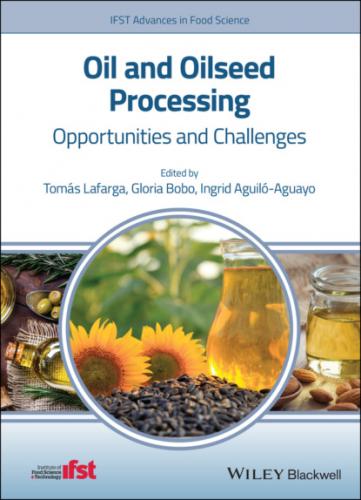Oil production from oilseeds has been steadily increasing by an average of 12.3% annually over the last three decades: for the main oils – palm (palm kernel plus palm oil), rapeseed, soybean, and sunflower seed oil – there is a production increase of 231.1%, from 45.73 Mt in 1990 to 151.42 Mt in 2017 (UN 2019). Despite recent advances in oil extraction techniques, this impressive increase in oil production could not have been achieved without an increase in the quantity of seeds harvested. Indeed, during the same time period, the production of palm fruits, rapeseeds, soybean, and sunflower seeds followed the same trend from 159.29 Mt in 1990 to 794.31 Mt in 2017, representing an 17.7% annual increase (UN 2019).
The aim of the current chapter is to give an overview of the production of the most relevant vegetable oils and oilseeds, focusing on soybeans, rapeseeds, sunflower seeds, palm fruits, and the oils derived thereof. This chapter will also discuss the production quantities and trade of other common oilseeds such as groundnuts, maize, or sesame seeds as well as novel sources for oil production that are expected to soon gain an increased industrial relevance.
1.2 Oilseeds and Oils: Production and Trade
The majority of the currently utilized vegetable oils are obtained from seeds or beans. Sources for vegetable oil extraction can be divided into three main categories: (i) those plants that are not grown for oil production, where oil can be considered as a by‐product; (ii) those crops that cannot be changed on a yearly basis, generally trees; and (iii) those crops that are planted annually such as sunflower, linseed, or rape (Gunstone 2011a). Currently, from the total oil and fat production, approximately 14% is utilized as a starting material for the oleochemical industry, 79–80% is used for human food as spreads, frying oils, or salad oils, and the remaining 6% is used as animal feed, and therefore, indirectly used for human food production (Gunstone 2011a). Crushing of soybeans or oilseeds into cake and oil dominates total usage and it is expected that 90% of the world soybean production and 86% of world production of other oilseeds will be crushed in 2027 (FAO 2018). The current section will discuss current applications as well as the production and trade of the most important edible oils and oil sources.
1.2.1 Copra and Coconut Oil
Coconut oil is obtained from the fruit of the coconut palm (Cocos nucifera L.), a tropical plant normally utilized for edible and non‐edible purposes. Two major types of oil can be obtained from coconut: (i) coconut or copra oil, which is obtained from the dried coconut flesh, also known as copra, and (ii) virgin coconut oil, obtained from fresh coconut flesh (Zuknik et al. 2016). Copra oil can be found either unrefined or refined, bleached, and deodorized (Kumar and Krishna 2015).
As a portable source of water (and food), coconuts played an important role in the ability of humans to voyage and colonize regions throughout the tropics (Gunn et al. 2011). Currently, coconut is an important crop in tropical countries where it plays an important role in diets and livelihoods (MacDonald et al. 2018). A large number of food products containing coconut oil have been launched into the market during recent years (Table 1.1).
Besides being used for frying or as an ingredient in baked goods, coconut oil is currently used for pharmaceutical and cosmetic applications, among others (Kumar and Krishna 2015). Over 12.30 Mha of coconut are currently planted across 89 tropical countries, mainly in Asia (Gunn et al. 2011) – Figure 1.1. Coconut plantations can now be found on practically every tropical and sub‐tropical coastline worldwide, distributed mainly in coastal regions between 20°N and 20°S (Ramanatha Rao et al. 2005). Coconuts are even cultivated far from the coast in many regions with adequate rainfall and altitude (Foale 2005). Over 95% of the farmers who grow coconuts are smallholders tending less than four hectares and lack the resources to invest in technologies that would improve production yields (Batugal et al. 2005). However, production and consumption of coconut oil is expected to increase in coming years and production of virgin coconut oil shows potential for improving coconut farm incomes by five to eightfold over traditional copra production (Bawalan and Chapman 2006).
Table 1.1 Foods manufactured using vegetable (and microalgal) oils.
Source: Data accessed on June 7, 2019 from MINTEL, available at http://www.mintel.com.
| Product | Brand | Company | Country of commercialization | Oil(s) used |
|---|---|---|---|---|
| Sour cream and onion flavored potato snack | Pringles | Pringles, USA | Argentina | Cottonseed and coconut oil |
| Roasted and salted peanuts | Pami | Pami, Greece | Croatia | Cottonseed and sunflower oil |
| Corn “tostadas” | Mamá Lycha | Productos Mamá Lycha, USA | Canada | Cottonseed, palm, and/or soybean oil |
| Chocolate cake with chocolate topping | Betty Crocker Mug Treats | General Mills, USA | Saudi Arabia | Cottonseed, palm, sunflower, and rapeseed oil |
| Tomato soup | Campbell's Soup at Hand | Campbell, Canada | Canada | Canola, corn, cottonseed, and or/soybean oil |
| Hazelnut cream with cocoa and breadsticks | Nut Bari | DKC Grup Gida San, Turkey | Turkey | Sunflower, cottonseed, and palm oil |
| Spicy vegetable tajine with bulgur, spelt, and raisins | Carrefour Veggie | Carrefour, France | Spain | Cottonseed and extra virgin olive oil |
| Breakfast cereals | Kellogg's Froot Loops | Kellogg Sales, USA | USA | Coconut, soybean, and cottonseed oil |
| Cookie covered almonds | 7‐Select | 7‐Eleven, USA | USA | Canola, cottonseed, palm kernel, and/or peanut oil |
| Apple pie | Royal Classic Dutch | De Specialiteitenbakkerij, the Netherlands | Switzerland | Cottonseed, rapeseed, and sunflower oil |
| Rice mini squares |
Kellogg's
|
